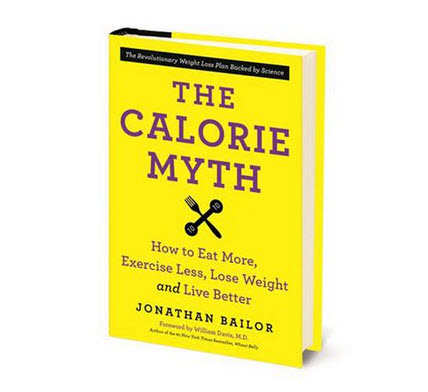The Calorie Myth: The Book You’ll Read and Pass on to Family in 2014

The short story here is: there’s a new book I recommend for 2014, The Calorie Myth, by Jonathan Bailor.
I learned many awesome nuggets from it, with even better research to back it up, and actually laughed a few times. If your name starts with Doctor, Grandma or anything in-between, this book will help you better understand food and health.
In some cases, authors spend 10-plus years writing a book. They pour 10, 20, or even 30 years of personal experience, research and knowledge into pieces of paper hoping that it will help you and they ask for a small return on their hard earned knowledge, but we have a secret.
An Author’s Secret: We Write for Selfish Reasons
The best books are written from an author to themselves. They’re written for selfish reasons. They’re written because there is a burning inner truth they wish they would have found earlier in life. They understand they will get to serve the world through their expressions. Not every book leaves a reader with this feeling, but Jonathan’s sure does.
In The Calorie Myth, Jonathan Bailor is slinging arrows into the heart of the biggest industries in the US, the government, and anyone else who uses marketing and research to spread nutrition myths causing our society to get fatter and sicker.
It will be released on January 1, 2014, and if you buy early you’ll get a bunch of extras. Here are some excerpts from the book to wet your palate.
1970s: Calories Matter! 2013: Calories Don’t Matter! Me Confused!
This calorie thing is confusing. With scientists, doctors, and fitness experts lining up on either side of a valley, trying to mimic a civil war blood bath. The “calories matter” crowd has been taking shots for over 30 years and the “calories don’t matter” group has been firing with much improved research.
Meanwhile, many of us feel like we’re standing in the middle flying the white flag and begging someone to tell us the truth.
Here’s the truth: It’s more complex than this black and white idea of calories. Here’s a great nugget from The Calorie Myth that highlights this.
“The first of the three Calorie Myths at the heart of our fat-loss and
health struggles is that calorie counting is required to avoid obesity and
disease.Calorie Myth #1: Weight Loss = Calories In – Calories Out
In June 2011, Barry Popkin and Kiyah Duffey, doctors at the University
of North Carolina at Chapel Hill, made a startling discovery. They
discovered that the number of calories consumed per person per day
increased by a jaw-dropping 570 calories between 1977 and 2006. At
first glance, it appeared that they definitively demonstrated what many
assumed to be the cause of our obesity, diabetes, and heart disease
epidemics: we are eating too much.However, a second glance at their data reveals an even more startling
discovery. If the average person is consuming 570 more calories
than necessary per day and if the calorie-counting math we hear about
daily is accurate, then the average person should have gained 476
pounds since 2006.Is it possible that instead of asking, “Why are we getting fatter?” we
should be asking, “Why don’t all of us weigh six hundred plus pounds?”
What could possibly explain the huge disconnect between the quantity
of calories we’re eating and the quantity of fat we’re gaining?Here are three possible explanations:
1. We’re eating less.
2. We’re exercising more.
3. The Calorie Math doesn’t add up.Let’s start with the first possible explanation: Did we avoid gaining
476 pounds because we cut calories dramatically after 2006? Obesity
and lifestyle-related disease rates have continued their upward climb, so
this doesn’t seem likely. And if we look at the preceding few decades,
this explanation just isn’t possible.Since the late 1970s, we have gradually worked our way up to eating
an additional 570 calories per person per day. But let’s estimate that
over those few decades, we each ate a more modest 300 additional
calories per day. According to traditional calorie math, the average
American should have gained 907 pounds of fat between 1977 and
2006.* It seems that we continue to consume more calories, but whatever
prevented those excess calories from causing everyone to gain 907
pounds between 1977 and 2006 also prevented each of us from gaining
476 pounds between 2006 and 2014.Let’s look at the second possible explanation: Did we avoid a 476-
pound weight gain because our level of physical activity increased
dramatically from 2006 to 2014? This theory holds up only if the average
person jogged for over an hour and a half every day for the past
eight years. That’s enough jogging to cross the entire United States
eleven times.That didn’t happen.
This possibility also suffers from the same challenge as the first.
The exercise explanation doesn’t solve the question of how we avoided
the previous 907-pound weight gain because, as we’ve all heard, we’ve
experienced a drop in physical activity that is actually believed to be a
major cause of the obesity epidemic.That leaves us with the third possible explanation—that we’re
better off thinking about weight in terms of biology, not math. We’ve
gained only a tiny fraction of those 476 pounds because our body
doesn’t work like a calculator.”
Does this clear anything up for you? It should at least clear up the idea that calories eaten are the sole source of gaining fat. And it should begin to allow you to ask better questions in the area of calories in = calories out.
Why Don’t All of Us Weigh 600+ Pounds!?!
The quality of your answers is determined by your questions. And the line above from Jonathan is a great example of flipping a problem on its head with a better question.
There are several questions that followers of this blog are likely to be curious about…
- What is a body-fat set point? And how can I get my body to have a lower one?
- What is a sensible exercise program for those of us who aren’t athletes?
- How do high quality foods affect my hormones?
And then you’ll likely have those in your near vicinity asking things like…
- So, if I don’t notice anything when I stop eating grains I can keep doing it?
- I only eat the healthy sweeteners, which ones do you think I should eat?
- Why am I not losing weight even though I’m eating less?
The Calorie Myth addresses all of these and more using science when necessary and plenty of stories, statistics and charts to break everything down so a kid or grandma can easily understand.
Fast Action Bonuses to Claim Before January 1, 2014
Here’s the deal: I love Jonathan’s message and he’s a friend and I’m trying to help him get on the NYT Best Seller list. So I’m letting you know about the big release today. He’s trying to get you to buy the book before January 1st so that he has a better chance of getting on the Best Seller list.
So he’s giving away:
- A Meal Plan
- A Shopping Guide
- And a Serving Size Guide
All free for those who buy before January 1, 2014.
And if you don’t end up investing in Jonathan’s book hopefully this post has helped you at least clear up one question. Do calories in equal calories out?
– Steve
Did You Like this Article?
Subscribe to our newsletter to receive email notifications, some ways to find relief, and next steps.
